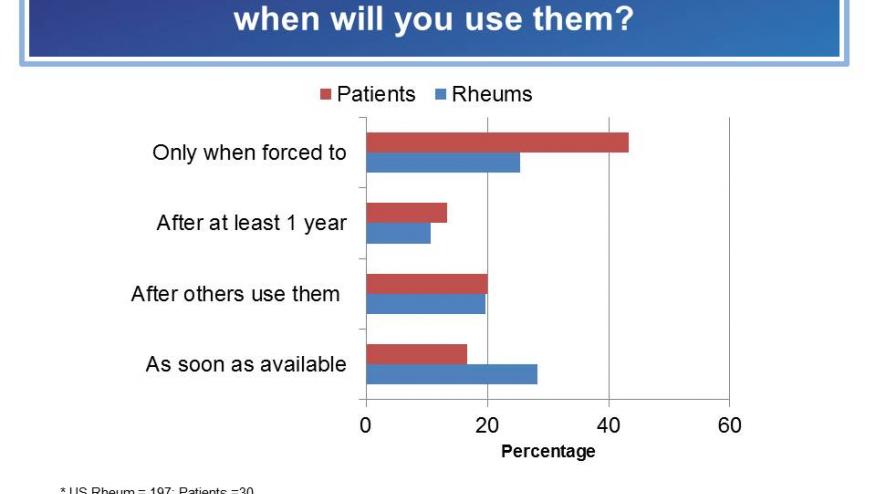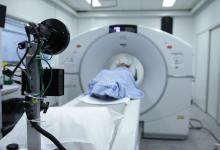Rheumatologists and Patients Concerns over Biosimilars - RheumNow “Live Vote” Results Save

A recent RheumNow “Live Vote” surveyed US and non-US rheumatologists and patients about their beliefs and concerns regarding the use, uptake and safety of biosimilars. While biosimilars have been in common use for years throughout Europe, their impact and uptake in the United States is uncertain.
There are currently 5 biosimilars approved for use in the USA, with four TNF inhibitors being approved in the 12 months preceding April 2017.
An email survey invitation was sent to nearly 1800 verified rheumatologists. A week later, a social media (Twitter) invitation encouraged patients to participate in the same online biosimilar survey. A total of 266 responses were received from 33 countries. The first week drew 197 responses (most voting in the first day) from verified rheumatologists in the RheumNow database. This included 141 US and 56 non-US rheumatologists from a total of 28 countries.
In the second week, social media brought in another 69 responses from 30 countries, and included 31 responses from patients (29 from the US and Canada) and another 23 from rheumatologists (12 US and 11 non-US).
Below are the comparative responses from rheumatologists and patients. USA and non-USA rheumatologists answers were very similar and the USA rheumatologist responses are shown below and compared to the patient responses garnered from a series of social media invitations. There are no correct answers, as these questions were intended to assess the perceptions of both rheumatologist and patient respondents. Dr. Artie Kavanaugh provides commentary below on these results.
Despite new biosimilar regulatory victories, widespread press, educational programs and ACR policy statements regarding biosimilars, there is considerable concern, knowledge gaps and hesitancy regarding biosimilar uptake in the US. The surveys primary question demonstrates that less than one-third of US rheumatologists are prepared to adopt biosimilars when they are available. Nearly 15% are unsure and over half (54.5%) are hesitant, unwilling and slow to adopt biosimilars after their introduction.
Question 1. As biosimilar biologic agents become available, when will you use them? | ||||
Response | Rheums | Patients | Commentary | |
a | As soon as available | 28.2% | 16.7% | Overall, patients and physicians are reluctant to readily adopt biosimilar agents when available. Most will either wait until “forced” to use or wait until others try them first. |
b | After others use them first | 19.7% | 20% | |
c | After at least a year | 10.6% | 13.3% | |
d | Only when forced to | 25.4% | 43.3% | |
e | Unsure | 14.6% | 6.7% | |
Question 2. How do you feel about using a biosimilar for psoriasis if it has only been tested in Crohn's colitis? | ||||
Response option | Rheums | Patients | Commentary | |
a | Worried about extrapolation & won’t use until studied in psoriasis | 36.3% | 40% | While rheums have concerns about extrapolation, patients appear to be uncertain about what this means to biosimilar prescribing. |
b | Concerned about extrapolation, but will probably use it in psoriasis | 38.1% | 10% | |
c | Extrapolation/use to other diseases (psoriasis) is fine | 16.7% | 10% | |
d | Unsure | 8.9% | 36.7% | |
Question 3. Monies saved using cheaper biosimilars should benefit whom? | ||||
Response option | Rheums | Patients | Commentary | |
a | Payer (Medicare, insurance, etc) to help other patients | 19.9% | 26.7% | There appears to be a uniform belief that the monies saved by adopting biosimilars should benefit the patient in some way. |
b | Pharmacy benefit manager (as profit | 6% | 6.7% | |
c | Patient (lower premiums or co-pays) | 63.9% | 60% | |
d | Physicians (who own infusion centers) | 3.6% | 0 | |
e | Unsure | 6.6% | 6.7% | |
Question 4. How concerned are you about the safety of the biosimilar biologic agents? | ||||
Response option | Rheums | Patients | Commentary | |
a | Not concerned, if FDA approved | 30.5% | 26.7% | Roughly 70% have some degree of concern about the safety of biologic agents. |
b | Slightly concerned | 42.5% | 20% | |
c | Concerned | 19.7% | 16.7% | |
d | Very concerned | 5.4% | 36.7% | |
e | Unsure | 1.8% | 0 | |
Question 5. Approved anti-TNF biosimilars will soon be available. What more information do you most need to prescribe a biosimilar? (choose one) | ||||
Response option | Rheums | Patients | Commentary | |
a | Interchangeability/switching | 50.9% | 33% | Interchangeability and safety appear to be the big hurdles in education. |
b | Extrapolation | 3% | 16.7% | |
c | Costs/discounts | 20.6% | 10% | |
d | Safety | 17% | 33% | |
e | No more info needed | 8.5% | 0 | |
Overall rheumatologists and patients are presently hesitant to use biosimilars, as only 28% of rheumatologists and 17% of patients are willing to use these agents when available. Moreover, these results indicate significant concerns regarding safety (17-24% of Rheums; 33-53% Patients), extrapolation (74% Rheums; 50% Patients), interchangeability (51% Rheums; 33% Patients) and costs (21% Rheums; 10% Patients).
The inconsistencies in some of these responses also suggest the need for education and clarity. When asked about what more information/education would be needed (question 5), the majority indicated a need for information on interchangeability, but only 3% for extrapolation. Yet when asked about extrapolation (question 2), 54.8% are comfortable with extrapolation and 41.2% were either unsure or worried about extrapolation.







If you are a health practitioner, you may Login/Register to comment.
Due to the nature of these comment forums, only health practitioners are allowed to comment at this time.